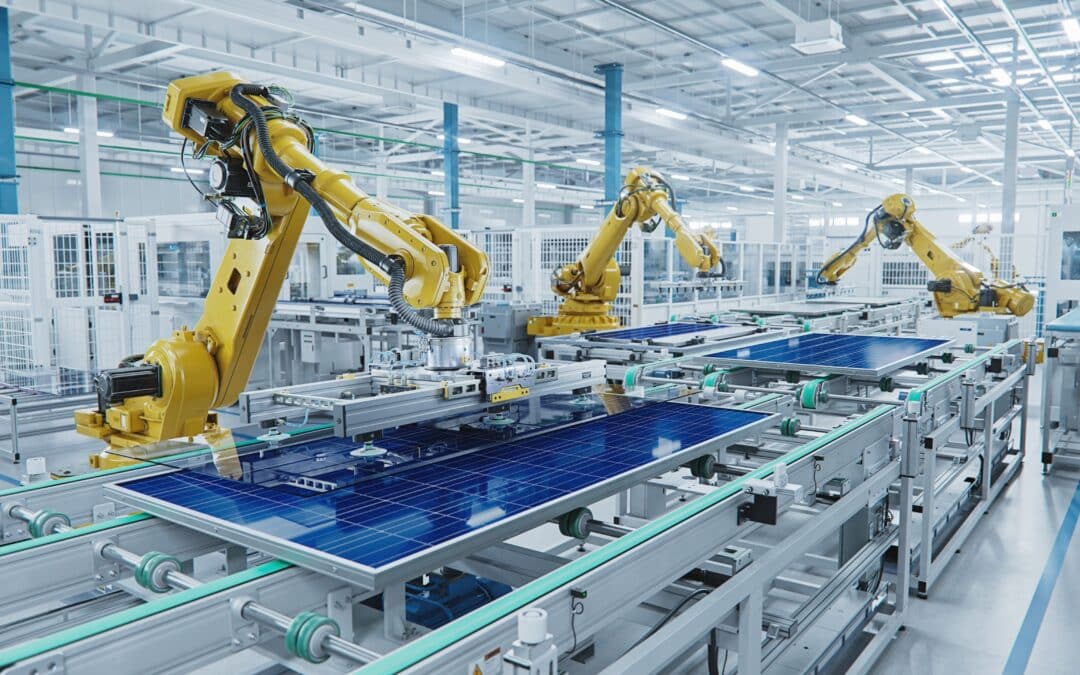Discover the power of smart manufacturing and the role of a manufacturing execution system in driving data analytics in manufacturing and automation in manufacturing. Learn how digital transformation in manufacturing and industry 4.0 technologies are reshaping production with proven smart manufacturing benefits.
Manufacturing leaders and executives are increasingly focusing on advanced digital solutions to elevate operational performance. This guide examines the evolution of production processes, explains what is smart manufacturing, and details how technologies such as a manufacturing execution system are at the heart of enhanced production efficiency. By integrating critical tools for manufacturing process optimization and leveraging data analytics in manufacturing, companies can harness transformative benefits without relying on overused phrases.
Understanding Smart Manufacturing and the Smart Factory
What Is Smart Manufacturing?
Smart manufacturing represents a shift from traditional practices to integrated digital production environments. It uses real-time data, automation, and advanced analytics to create agile processes.
Leaders ask, what is smart manufacturing? This approach combines machine learning, robotics, and system-wide connectivity to achieve substantial improvements in quality and efficiency. At the core of these innovations is the manufacturing execution system, which links shop-floor operations with enterprise-level systems for complete visibility.
Defining the Smart Factory
A smart factory is a facility where digital and physical systems interact seamlessly. In this setting, interconnected machinery, sensors, and software enable continuous monitoring and control. This environment adheres to the smart factory definition by ensuring that every component works in harmony. Modern facilities implement smart factory automation and deploy smart factory software to coordinate operations and support real-time decision-making. The convergence of these technologies leads to the creation of a smart connected factory, a critical element in modern production.
Core Technologies Driving the Transformation
Digital Transformation and Data Analytics
At the forefront of production innovation is digital transformation in manufacturing. The ability to collect and analyze vast amounts of data is reshaping how companies approach manufacturing process optimization. With advanced data analytics in manufacturing, organizations extract actionable insights from sensor networks and production logs. These insights inform strategies that boost efficiency and reduce waste.
Automation, Robotics, and AI
The integration of automation in manufacturing and robotics in manufacturing has redefined production capabilities. By deploying ai in manufacturing, companies can automate complex tasks, reduce error margins, and enhance quality control. These tools work in tandem with industrial automation systems to streamline repetitive processes and allow human operators to focus on strategic initiatives.
Integration of Manufacturing Execution Systems
A central component of modern production is the manufacturing execution system. This solution connects disparate systems and provides a unified view of operations. It plays a vital role in managing tasks across production lines, supporting manufacturing process optimization by ensuring that every action is measured and adjusted in real time.
The Impact of Industry 4.0 Technologies
The Role of Industry 4.0 in Production
Industry 4.0 technologies introduce connectivity and interoperability into manufacturing processes. By linking physical systems with digital counterparts, companies benefit from enhanced smart manufacturing benefits such as reduced downtime and increased flexibility. The adoption of industry 4.0 technologies facilitates real-time monitoring and enables companies to react swiftly to changes in demand.
Intelligent Manufacturing and Industrial Automation
Intelligent manufacturing leverages real-time data and industrial automation systems to create dynamic production environments. With the support of smart manufacturing solutions, manufacturers are shifting away from static production lines toward facilities that respond automatically to evolving conditions. These innovations are at the heart of the smart manufacturing industry 4.0 movement, which integrates physical processes with digital intelligence.
Enhancing the Supply Chain
The concept of supply chain 4.0 plays an essential role in modern production. Enhanced visibility across the supply chain allows for improved coordination and efficiency. This level of oversight supports manufacturing intelligence by integrating every aspect of the production process—from raw materials to finished goods—and ensuring that operations remain streamlined and responsive.
Implementing Smart Factory Solutions
Strategies for Effective Integration
Successful transformation begins with a clear strategy. Companies must define what they aim to achieve with smart manufacturing solutions and ensure that their approach aligns with broader business objectives. A critical component is the integration of a manufacturing execution system, which acts as the nerve center of operations. Leaders must assess current workflows and identify areas where manufacturing process optimization will yield significant improvements.
Investing in Scalable Technologies
Scalability is key when deploying new technologies. Investments in smart manufacturing technology and smart manufacturing software must be designed to grow alongside the business. Companies should choose systems that can adapt to changing demands and incorporate emerging trends, ensuring long-term viability and competitive advantage. Implementing smart factory solutions that support scalable growth is essential for sustaining improvements in productivity.
Fostering a Culture of Continuous Improvement
Change is not solely technological—it is also cultural. Fostering a mindset of continuous improvement ensures that every team member contributes to the success of digital initiatives. Emphasizing the practical benefits of smart manufacturing benefits reinforces the need for ongoing adaptation. Collaboration across departments facilitates knowledge sharing and accelerates the adoption of smart industry 4.0 practices.
Real-World Applications and Smart Manufacturing Examples
Automotive Sector Innovations
In the automotive industry, the integration of robotics in manufacturing and sophisticated analytics has redefined production lines. Car manufacturers employ smart manufacturing solutions that combine automated assembly with real-time quality control. These smart manufacturing examples demonstrate how a smart connected factory can enhance output while minimizing waste, resulting in significant cost savings and improved vehicle quality.
Electronics and Consumer Goods
Electronics manufacturers have embraced automation in manufacturing to achieve rapid product turnaround and superior quality control. Through smart manufacturing technologies, production lines are reconfigured swiftly to respond to market demands. The use of advanced smart factory technology has allowed companies to optimize operations and adapt production volumes based on real-time insights, exemplifying the power of smart production in a competitive marketplace.
Aerospace and Defense Applications
Aerospace companies require precise manufacturing to meet stringent quality standards. By deploying smart manufacturing solutions, these organizations achieve higher levels of consistency and accuracy. Implementing smart manufacturing industry 4.0 practices, including integrated smart factory automation, supports rigorous testing and quality assurance processes. The result is a production system that adheres to the manufacturing 4.0 definition while providing exceptional performance and safety.
Case Study: Food and Beverage Manufacturing
In the food and beverage sector, companies utilize real-time data and smart manufacturing software to enhance product traceability and compliance with safety regulations. Integrating a manufacturing execution system with smart manufacturing trends facilitates seamless monitoring of production processes, reducing spoilage and ensuring quality standards are met consistently. This case study underscores the value of adopting smart manufacturing solutions in diverse environments.
Evaluating the Smart Manufacturing Market
Market Growth and Investment
The smart manufacturing market is expanding rapidly as organizations invest in digital tools that improve efficiency and reduce costs. This surge in investment reflects growing confidence in smart manufacturing benefits and the potential of smart factory solutions to drive long-term value. As companies transition from traditional systems to digitally enabled processes, the market for smart manufacturing technologies is poised for significant growth.
Trends Shaping the Future
Ongoing trends such as smart manufacturing trends and the integration of smart industry products continue to reshape production practices. Companies are increasingly adopting solutions that deliver measurable improvements in performance. The combination of ai in manufacturing and enhanced automation in manufacturing is setting new standards for productivity. As organizations pursue smart manufacturing industry 4.0 initiatives, the convergence of digital and physical systems becomes more pronounced.
Best Practices for Adopting Smart Manufacturing
Develop a Clear Roadmap
Establishing a strategic roadmap is crucial. Define objectives, identify target areas for manufacturing process optimization, and plan the deployment of key systems such as a manufacturing execution system. This roadmap should address both technological upgrades and organizational changes needed for sustained success.
Prioritize Interoperability
When selecting technologies, ensure that new systems integrate smoothly with existing infrastructure. Prioritizing interoperability will facilitate the adoption of smart manufacturing solutions and support the seamless functioning of a smart factory. Choosing solutions that adhere to the manufacturing 4.0 definition can significantly reduce implementation challenges.
Encourage Workforce Engagement
Empower employees by providing training and resources that promote understanding of digital tools. A workforce well-versed in data analytics in manufacturing and automation in manufacturing will drive improvements more effectively. Engagement and collaboration across teams foster an environment where continuous improvement is the norm.
FAQs
What is smart manufacturing?
Smart manufacturing is an integrated approach that uses digital technologies, such as a manufacturing execution system, data analytics in manufacturing, and automation in manufacturing, to optimize production processes and enhance operational efficiency.
What defines a smart factory?
A smart factory is a facility where interconnected systems—including smart factory software, smart factory automation, and digital sensors—work together to create a responsive and efficient production environment.
How does a manufacturing execution system improve production?
A manufacturing execution system provides real-time monitoring and control of production processes. It enables manufacturing process optimization by integrating data from various sources and ensuring that every stage of production is aligned with overall business objectives.
What benefits does smart manufacturing offer?
Smart manufacturing offers improved efficiency, reduced downtime, enhanced quality control, and better supply chain integration—all of which contribute to measurable smart manufacturing benefits.
How do Industry 4.0 technologies influence production?
Industry 4.0 technologies connect physical and digital systems, fostering a networked production environment that supports real-time decision-making and continuous process improvement.
By understanding the core components of smart manufacturing and adopting a holistic approach, organizations can create a production environment that not only meets current demands but is also equipped for future challenges. Integrating a manufacturing execution system and embracing digital transformation in manufacturing are pivotal steps in achieving significant improvements in both efficiency and product quality. With a commitment to continuous improvement and a clear strategic roadmap, companies can unlock the full potential of smart manufacturing and industry 4.0 technologies.
In summary, the convergence of advanced digital solutions—ranging from ai in manufacturing to industrial automation systems—is laying the foundation for modern, efficient production processes. The integration of systems such as smart manufacturing software and smart factory solutions enables manufacturers to optimize workflows and adapt to market demands swiftly. Embracing these strategies leads to a fully integrated production ecosystem characterized by high levels of manufacturing intelligence and operational agility.
Investing in a smart manufacturing market solution is not merely about adopting new technology; it is about redefining how production processes operate in a connected world. By leveraging key tools for manufacturing process optimization and implementing a unified manufacturing execution system, companies can drive efficiencies that extend throughout the entire supply chain. This holistic approach empowers organizations to harness the benefits of smart manufacturing trends while remaining adaptable to rapid changes in technology and market dynamics.
The future of production depends on the ability to integrate advanced technologies with traditional methods, creating a framework where every process is optimized, every decision is data-driven, and every outcome is measurable. With the strategic adoption of smart manufacturing solutions and a commitment to digital excellence, manufacturers can achieve significant gains in productivity and quality. Embracing these innovations will be the key to sustaining long-term success in an increasingly competitive marketplace.
Manufacturers that align their operational strategies with the principles outlined in this guide will be well positioned to capitalize on the benefits of a fully integrated production environment. Through a careful balance of technology, process improvement, and workforce engagement, the shift toward a truly smart factory becomes not only feasible but essential. This integrated approach ensures that production systems are resilient, adaptable, and capable of meeting the challenges of a dynamic market landscape.
The journey toward a smarter, more efficient production process is complex, yet the rewards are substantial. By investing in the right technologies and fostering a culture of continuous improvement, companies can achieve a level of operational excellence that translates into long-term competitive advantage. Embrace the advancements in smart manufacturing and industry 4.0 technologies to secure a future where every facet of production is optimized for success.


